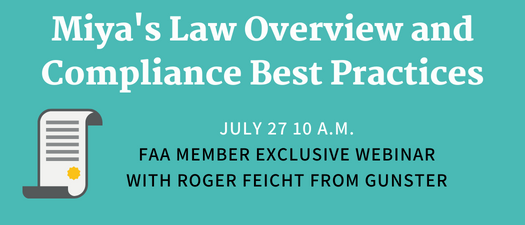Miya's Law Overview and Compliance Best Practices
ZOOM
Event Details
In the fall of 2021, Miya Marcano was brutally murdered by a maintenance technician, who worked at the same property where she worked and lived on-site. In light of pre-session discussions related to apartment safety after the tragic murder, it became clear legislation was likely to be introduced during the 2022 session related to apartment employee screening and key access.
FAA leaders and members determined it was critical for the apartment industry to be proactive, rather than reactive, in identifying a policy solution. Prior to the start of the 2022 session, FAA worked to draft an alternative policy solution that merely codified industry best practices related to employee background screening and key access. Thankfully, after many meetings with Senator Linda Stewart and Representative Robin Bartleman, the alternative proposed by FAA was ultimately included in the legislation, also known as Miya's Law, which was signed into law on June 27 by Governor Ron DeSantis.
- All apartment employees to undergo a background screening as a condition of employment. This screening can be done by a credit reporting agency (CRA) in accordance with the Fair Credit Reporting Act and must screen records in all 50 states and D.C. (effective 1/1/23).
- Apartment communities to establish policies and procedures related to key access and to maintain a log accounting for the issuance/return of keys. The state Department of Business and Professional Regulation (DBPR) can request proof of compliance during annual inspections (effective 1/1/23).
- Increases the reasonable notice period from 12 to 24 hours to enter an apartment home.
- Prohibits hourly rental of an accommodation (effective 7/1/22).


